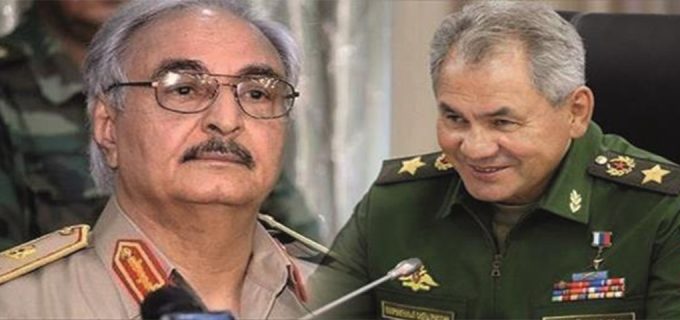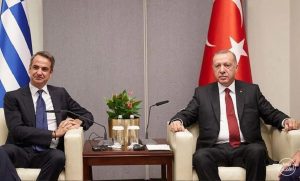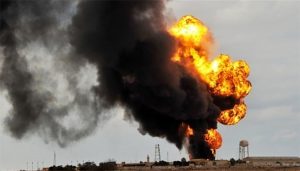On May 26, 2020, Commander of the US Africa Command, Stephen Townsend, announced that Russia had sent fighters to Libya to support the forces of Khalifa Haftar. The announcement claimed that the fighters left Russia for Syria first, where they were repainted to disguise their Russian origin, before heading to Libya.
The US Department of Defence said, according to its spokesman Jonathan Hoffman, that these forces “were stationed at the Al-Jafra base in the centre of the country, and they numbered 14, which is a mixture of Sukhoi 24 and MiG-29”.
Russia’s support for Haftar’s forces is constantly denied by Russia despite clear evidence of this interference. Indeed, recent statements were rejected by Russia. First Deputy Chair of the Federation Council Committee on Foreign Affairs, Vladimir Dzhabarov, said: “Russia has not sent military personnel to Libya and the Russian upper house of parliament has not received a request to approve such a dispatch”.
US statements warned against the repetition of the Syrian experience in Libya. Meanwhile, it contended a political shift in its Libyan file reflecting the military progress made by the Al-Wefaq government (Government of National Accord), raising a number of questions regarding the motives of the Russian interventions and limitations, and indicating US warnings and the extent of their respective influence on the Libyan file.
First: Russian motivations and their limits of influence
Libya is gaining a strategic dimension in the Mediterranean Sea, and an important strategic location linking the East and West, and it has tremendous oil wealth that has made it sought after by many countries in the framework of the power struggle practiced by the powerful nations.
1- Russian political and military motives
Russia’s relationship with Libya dates back to the end of World War II, when the second leader of the Soviet Union, Joseph Stalin, tried to agree on a Russian mandate for Tripoli, but did not succeed. Russia’s relationship continued with the Gaddafi regime, with which it signed a number of agreements, including the 2008 arms deal agreement, according to which Russian naval vessels were permitted to use the Benghazi Port. Thereafter, Moscow cancelled most of Libya’s debt in exchange for contracts related to oil, gas, weapons and railways.
Then NATO, which entered the scene after the Libyan revolution in 2011, weakened Russia’s intervention, until Khalifa Haftar began to weave alliances with Russian leaders. Haftar benefited from Russia’s military support in his coup against the Al-Wefaq government.
Russia is keen to expand in the available voids and take advantage of the burning crises in the region to strengthen its influence and increase its control in the region. For this, Russia seeks to secure a number of strategic goals in Libya, such as:
– Secure centres for its marine units and a supply station for Russian ships in the Mediterranean. Thus, it realises the importance of Libya in the Mediterranean; and allowing Russia to achieve influence in Libya will allow Libya to gain influence in Europe and Africa in general. The Libyan ports, especially Tobruk and Derna, are logistical and geostrategic centres for the Russian naval force linking it with Tartus in Syria.
– Khalifa Haftar as a suitable ally to preserve its interests in Libya. Russia’s intervention in Libya came in exchange for Haftar giving it permission to benefit from Libyan energy sources, in addition to Haftar’s request to Russia to open a military base in Libya, according to a statement by the head of the Russian Liaison Committee in Libya, Lev Dingov, as reported in Sputnik.
– Control of Libya means the control of refugees migrating to Europe. This means that Russia would hold the immigration card, and thus have Europe in a stronghold.
– Securing its interests in Syria, using Libya as a card for political bargaining, especially since some of those present in the Libyan file are themselves in Syria.
2- The limits of direct and indirect Russian influence and the possibility of its dissolution
Russia’s interventions to support the coup in Libya against the internationally recognised Fayez al-Sarraj government began to appear publicly after 2017 when Russia treated a number of wounded Haftar forces. In the following year, it sent a number of armed groups to fight alongside Khalifa Haftar’s forces. Therein, Russia used military companies, the most famous of which is the mercenary ‘Wagner’, owned by Russian businessman Yevgeny Prigogin, who is close to Russian President Vladimir Putin. This company handles a number of international tasks.
Russia’s keenness to support Khalifa Haftar militarily indirectly, camouflaging Russian fighters coming into Libya, and the use of unofficial forces, is due to a number of reasons. Some of these may include:
– Indirect military presence through Wagner is a strategy Putin uses in many countries. This company contributed to the annexation of Crimea, engaged with separatists in Ukraine, and represented Russian presence in Syria, before its current involvement in Libya.
– Moscow is trying to evade legal responsibility and international sanctions for the activities of these groups.
– The possibility of Russia presenting itself as a mediator in the war, or sponsoring any future agreement, without abandoning these groups. It can also escalate via these groups to achieve the strategic goals it seeks.
– The conflict in views on the Libyan file between Russia’s Foreign Minister Sergey Lavrov, who supports the political solution, and Minister of Defence Sergey Shoigu, who supports Haftar, makes public support for Haftar a premature feat.
3- Factors that strengthen Russia’s presence in Libya
– The ability to have direct dealings with countries of the region that have a direct relationship with the Libyan file, especially Egypt and the UAE. The formation of this alliance provided a means for Russia’s interventions in Libya. Indeed, one of the triggers for the war in Libya, despite its illegality – according to observers’ expectations – is that there is financial support for Russia. Russia’s use of private companies may be a sign of this, as well as Russia’s prompt support for Sisi’s initiative, which explains the level of coordination between these countries.
– Russia can benefit from the European’s weak role in Libya and the absence of the US role. Through this, Russia has managed to adopt the Libyan file politically by hosting dialogue between the parties of the conflict, as well as indirect military support for Haftar.
– Some forces were keen to bring down the Al-Wefaq government as an extension of the Arab Spring revolutions.
In May, the UN Sanctions Committee panel of experts exposed Russia’s fulfilment of most of Haftar’s requests, which are:
– To make recommendations to enhance Haftar’s influence, provide him with a political analysis of the situation, and support him in the media.
– Conduct secret negotiations between Haftar and other Libyan parties, the most famous of whom is Saif al-Islam Gaddafi.
– Provide military and technical support for Haftar, which includes working on the maintenance of 536 military vehicles.
Russia understands US behaviour very well. Its previous persistence in direct and indirect political presence, which lost the cover of legitimacy, perhaps means that the US was turning a blind eye to certain reports. This presence, particularly the military, could fade, with the possibility of the US presence being absent from the Libyan scene in the earlier stage.
Second: US motives and the limits of influence
The justifications for US intervention in the Libyan file may be deeper than Russia’s justifications, but the Russians are more present that the US side, and the US position is considered volatile. There are those who see this as giving up the European role, while others see it as an attempt to implicate both Russia and Turkey in the file. Indeed, the condoning of the sale of weapons – directly or indirectly – to Libya from Europe and US may confirm this. However, the variable on the political scene is the new statements by the US leadership
1- US motivations and concerns
The statements of the US military leadership in North Africa carried a clear position, and they were consecutive and simultaneous with a number of statements and actions, including:
– The statements of the US Ambassador to Libya, Richard Norland, in which he said: “the US wants an end to the offensive of Khalifa Haftar’s forces on Tripoli, a permanent ceasefire and a negotiated peaceful solution to the conflict,” describing what is happening in Libya as a “regional proxy war”.
– US’s request to the member states of the Security Council to help withdraw mercenaries from Libya, and to ensure the implementation of the UN Security Council resolutions related to the arms embargo on Libya.
– The statements of the US Africa Command regarding the possibility of deploying its forces in Tunisia, against the background of Russia’s military activities in Libya.
– The State Department’s statements that Malta seized the equivalent of $1.1 billion in forged Libyan currency, which was printed by a Russian government company intended for Haftar’s account, stressing that the legitimate bank in Libya is the central bank run by the Al-Wefaq government.
The change that occurred came following the new developments on the military scene, with the Al-Wefaq government on one hand, and Russia’s attempts to increase its support for Haftar on the other. Perhaps the US statements had multiple reasons revolving around two dimensions – one military and the other economic.
Military dimension
The US participated previously in a military campaign targeting ISIS sites in Sirte in 2016, and it does not trust Russia to confront these groups, as is evident in Syria. Thus, some may see these statements as a prelude to studying the possibility of military intervention, even though this seems unlikely currently.
The statements can also be read in the context of the progress being made by the Al-Wefaq government, in addition to it being a sign of a US desire to re-establish military position in North Africa, especially after establishing military contacts with Tunisia.
The economic dimension
Russia is currently the largest source of gas to Europe. This role is strongly opposed to by the US, and sanctions have been imposed on companies concerned with the construction of the Russian gas pipeline ‘Nord Stream 2’, which strengthens Russia’s influence in Europe. Russia’s control of Libyan gas means strangling Europe from the south, and the US seeks to limit this influence.
3- Limits of US influence in the Libyan file
US influence in the Libyan file grew during the era of President Obama, who pushed for the issuance of Security Council Resolution 1970, which allowed military intervention to topple Gaddafi, followed by resolutions related to the file on terrorism. Perhaps two main determinants are:
Increased Russian influence and weak European presence
The US previously supported European efforts in Libya, but the European role in Libya is currently weak compared to Russia’s diplomatic and military presence. Moreover, the contradictory European position, especially the French, with statements in favour of the Al-Wefaq government, and indirect military support for Haftar via Egypt and the UAE, can be read in the context of a conflict of influence in the region and the keenness to take advantage of the parties to the conflict. This European weakness suggests that the US will not allow Russia to increase its military presence in Libya as this will lead to an increase in Russia’s influence by controlling the path of international migration to Europe, controlling Libyan oil, increasing Russian presence in North Africa, as well as other internal and external effects related to Russia’s control of the Mediterranean.
The impossibility of direct military intervention
The US statements in support of the Al-Wefaq government were not accompanied by a practical position on Haftar, even though they declared their opposition to the progress of his forces. There may be no direct military intervention unless there is a real targeting of the US strategy in the region. This would be represented by oil, fighting terrorism and confronting Chinese-Russian expansion. It has become impossible to settle this in ways other than that of military intervention.
US intervention may confuse Russia’s political papers, and if there is political coordination between the US and Turkish sides, progress may occur at the level of the Al-Wefaq government forces, especially since Turkey intervened in Libya with the support of NATO, where the US is the leading superpower. It is expected that the US role in Libya will grow politically in the coming phase.
Conclusion
The US may encourage a political solution in Libya to block the road to Russia. If Russia guarantees some of its interests, it is possible that it would sacrifice Haftar, especially if the Libyan parties accept the initiative announced by Aqila Saleh, Speaker of the Tobruk Parliament, at the request of Russia, or if Sisi’s initiative, which was initially completely rejected, is modified. Nevertheless, a political solution may be one of the best options for the Libyan file. Indeed, the external parties may not mind any new solution, especially Russia, which faces US and European rejection.
The balance of power on the ground is moving in the interest of the Al-Wefaq government after the liberation of the Al-Watiyah base and Tripoli airport, and the complete control of areas affiliated with Tripoli, as well as the announcement of control over the city of Tarhuna and the approach of the Al-Wefaq government forces to Sirte. Furthermore, there have been external movements of the parties to the conflict between Ankara, Cairo and Moscow, as well as the UN announcing that the two sides have agreed to resume ceasefire talks. All of these indicators suggest the possibility of entering into political negotiations, and these negotiations may lead to a political solution. This depends on the ability of these parties to impose their options on the ground. Conversely, all attempts may fail, and Libya may turn into an international point of conflict.







